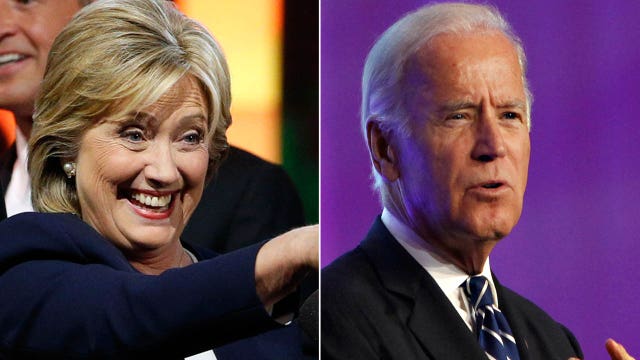Will Clinton's debate performance keep Biden on sidelines?
Strategy Room: Joe Lestingi and Ashley Intartaglia on whether the vice president jumps into the race
Hillary Clinton was seen to help stabilize her faltering campaign Tuesday night with a debate performance that left little doubt she has a solid grip on the Democratic presidential race -- and may have sent a strong message to Joe Biden that time is running out if he envisions jumping in.
The Democratic front-runner and her closest competitor, Vermont Sen. Bernie Sanders, dominated the debate stage in Las Vegas, relegating the other low-polling candidates to footnote status. But with the most to lose Tuesday night, the Clinton camp seemed to come out of the debate revitalized, with aides calling it the "best day" of their campaign.
"I think things have stabilized," Clinton pollster Joel Benenson said.
That claim will be put to the test in the coming weeks. The vice president continues to mull a 2016 bid, and the debate had been viewed by analysts as a significant factor in that ultimate decision.
Biden watched the debate Tuesday night from afar, at the Naval Observatory residence -- and time will tell whether he thinks there's still room for him. On Wednesday, Biden said only that all the candidates did a good job and he's "proud of all of them."
In comparison with the Donald Trump-dominated GOP debates, the lead-off showdown in Las Vegas Tuesday night was a relatively cordial affair for the Democrats, with the lively disputes centering on policy differences and not personal put-downs. But Clinton was the clear lightning rod, challenged early and often on her shifting positions - while also hitting back and trying to position herself as a practical progressive with every bit as much credibility with the base as candidates like Sen. Bernie Sanders.
"I'm not taking a backseat to anybody on my values, my principles and the results that I get," Clinton said, describing herself as a "progressive who likes to get things done."
The front-runner, who has faced an insurgent challenge from her left in Sanders' campaign, was visibly ready to tangle Tuesday with him and the three other candidates on stage at the CNN-Facebook debate.
While Sanders railed against a "casino capitalist process," Clinton warned against abandoning the system that built America's middle class. And Clinton sparred with Sanders and others as they questioned her call for a no-fly zone in Syria, and criticized her 2002 support, as a senator, for use of force in Iraq, a decision she's since called a mistake.
Former Rhode Island Sen. Lincoln Chafee called it a "poor decision" and said he did his "homework" when he opposed that measure.
Clinton, in her defense, noted that President Obama asked her to be secretary of state because "he valued my judgment."
When former Maryland Gov. Martin O'Malley suggested lawmakers were overtaken by "war fever," Clinton quipped: "I am in the middle here - lots of things coming from all directions." She then tweaked O'Malley by thanking him for endorsing her in 2008.
While Clinton and Sanders sparred at times, the Vermont senator mostly avoided aggressively attacking Clinton on stage.
When Clinton was pressed on her personal email scandal, Sanders even jumped to her defense.
In one of the more memorable moments of the night, Sanders said: "I think the secretary is right. ... The American people are sick and tired of hearing about your damn emails."
Clinton said, "Me too." She thanked him and shook his hand.
Chafee, though, added that "credibility is an issue."
The exchange came after Clinton responded to a question on the email scandal by saying she's taken responsibility for it and acknowledged it was a mistake.
She quickly pivoted to challenging the work of the congressional Benghazi committee, calling it "basically an arm of the Republican National Committee."
The former secretary of state was also challenged on her policy flips by moderator Anderson Cooper, who asked if she will say anything to get elected.
"I've been very consistent over the course of my entire life," Clinton responded. But she said "like most human beings," she has absorbed new information.
Clinton was specifically challenged for opposing the Pacific-nation trade deal she once supported as secretary of state. Though she once called it the "gold standard," she said Tuesday the deal "didn't meet my standard." She said she couldn't tell voters it would raise their wages.
Clinton, though, tried to turn the tables on her rivals, and took a crack at Sanders' record on gun control.
Asked if the Vermont senator is tough enough on gun violence, Clinton said, "No, not at all" and urged the country to stand up against the NRA.
She criticized him for voting for a 2005 bill giving gun manufacturers immunity from lawsuits. After Sanders described that bill as complicated, she said, "It wasn't that complicated to me."
Sanders responded, "All the shouting in the world" is not going to end the violence. He said the country needs to reach a consensus, and stressed that rural states view gun laws differently than other states.
Throughout the debate, former Virginia Sen. Jim Webb, the fifth candidate on stage, struggled to elbow his way into the conversation. He stressed his military experience and push for criminal justice reform and other issues while in the Senate.
Toward the end of the debate, Webb challenged Sanders for his big-spending proposals
"Bernie, I don't think the revolution's gonna come," he said, adding he doesn't think Congress would pay for a lot of his plans.
Webb, Chafee and O'Malley are all averaging at or below 1 percent in the polls nationally, according to RealClearPolitics.













































